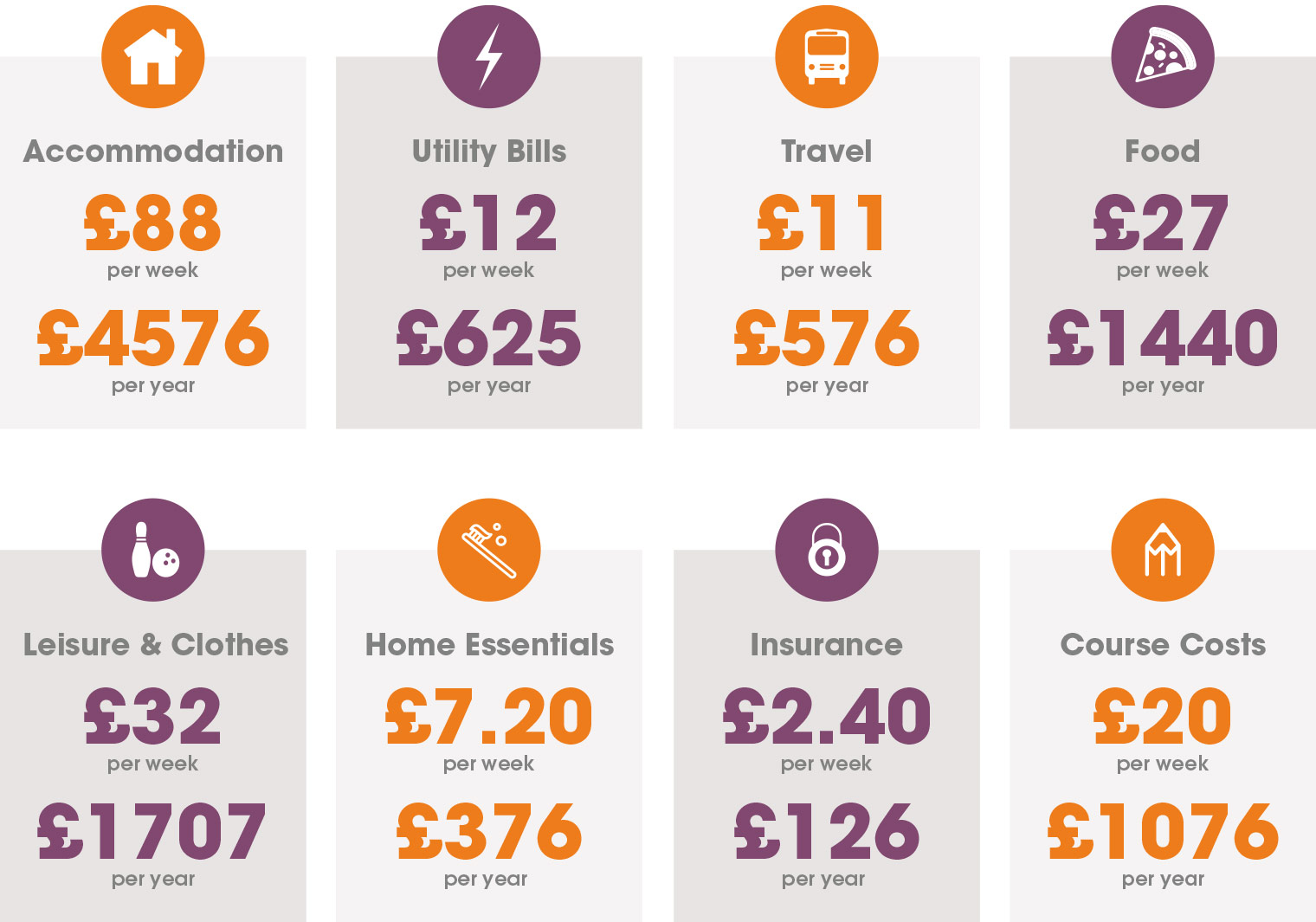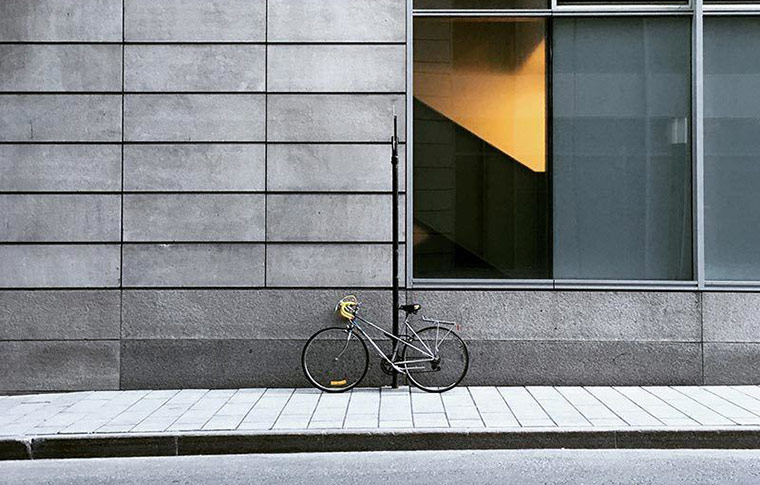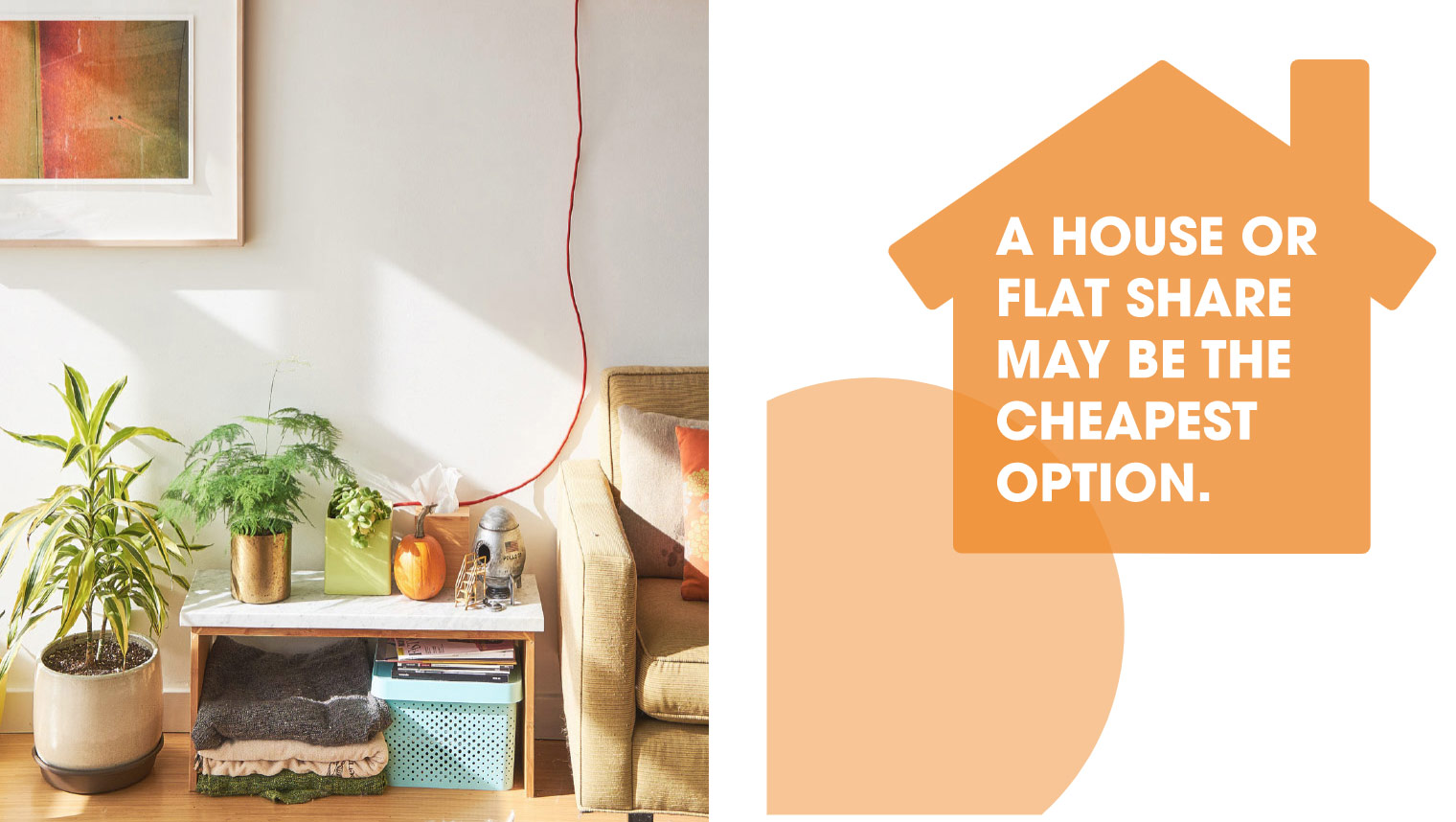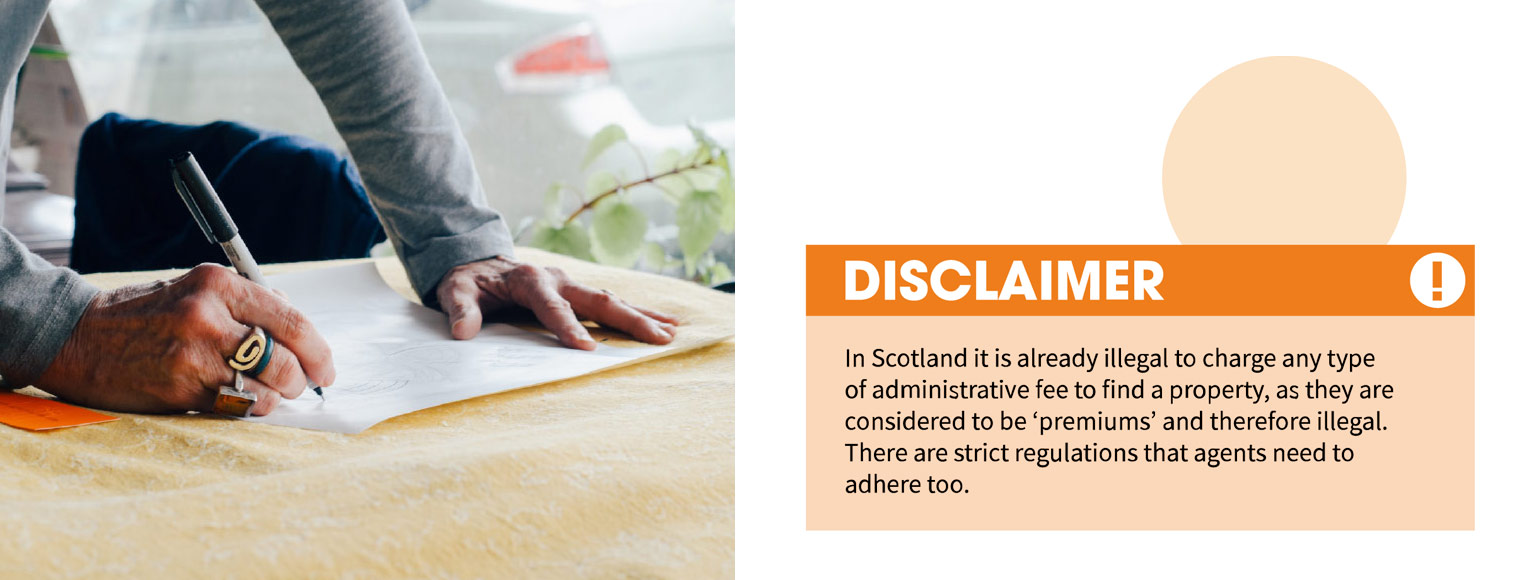WHERE DOES MY MONEY GO? The complete guide to budgeting for student accommodation

CONTENTS
Being a student is an expensive business now. It is likely that you will be spending around £9,000 p.a. on your tuition fees alone. At the time you graduate you are likely to owe around £40,000. While you study, your biggest expense will be your accommodation – as you don’t pay your tuition fees until you have graduated.
To help, the team at www.accommodationforstudents.com has used their years of experience in helping students to find accommodation to put together this comprehensive guide to the costs of renting student accommodation. To be even more helpful we have also included some of the other costs you can expect to pay while you study, so that you can start to budget.

Rent - How much will it cost to rent student accommodation?
The largest element of your accommodation costs is going to be your rent. In the UK it has become increasingly popular to rent accommodation and this has meant that rents have steadily increased over the years.
As a student the good news is that you do have a choice of different types of accommodation and this does give you a range of rents to choose from so you should be able to find something to fit within your budget.
‘Average’ rents
The average rent for a student house in the UK is £88 per week, while a University Hall will cost closer to £145 and a private hall £168 per week. However these are averages and they conceal some significant differences in values. Despite these headline figures there is accommodation available to suit most budgets. How much you pay is really down to three factors:
Location, Location, Location
There is a huge variation in accommodation price between the most expensive University Cities and the least expensive. London is by far the most expensive place to find student accommodation in the UK. A Private Hall of Residence is likely to cost at least £280 per week and a room in a house share £130 per week. At the other end of the spectrum a house share in Stockton will cost £60 and a private hall in Bradford will cost around £87 per week.

PRIVATE HALLS
THE AVERAGE RENT
COST PER WEEK


HOUSE SHARE
THE AVERAGE RENT
COST PER WEEK


It is worth knowing
It is also important to be aware that there is variation of rental prices within cities. Therefore it is possible to:
- Find a relatively low cost property in an expensive city.
- Rent an expensive place in a cheap city.
In recent Accomodation for Students’ research, the biggest different between the cheapest student accommodation and the most expensive was in London with a difference of almost £160 per week. Therefore doing your research in more depth into your city is also a good way to make sure you find something within your budget. You can find detailed neighbourhood guides on www.accommodationforstudents.com.
Type of accommodation
The type of accommodation you choose will also impact on your budget. In short if you are looking for the lowest cost option a house or flat share is the best way to go. This is where you rent a room in a property as part of a group and the average cost is £88 per week (£130 in London) Halls of Residence are most likely to cost you more money. Private Halls are likely to be the most expensive option. Typically this type of accommodation will be of the highest speci cation and have the biggest range of facilities and be located close to your campus. For this you are likely to pay around £168 per week (£280 in London).
University owned halls are a bit cheaper, costing on average £140 per week. They are likely to have a lower spec than the private halls, but will benefit from the best locations as well as being the best option for students who are new to University to meet new people.

Timing
The final factor to consider is timing. The earlier in the year that you start looking for a place to live, the wider the pool of options you will have. Broadly speaking, in most university cities if you start your search in January you will have access to the full range of accommodation that will be available in the following September.
The later you leave the search the fewer options you will have when it comes to price. It is important to bear this in mind when you are thinking about budgeting, but equally important not to rush into making a decision until you are sure you have found the right place for you.
Summary
Being a student is increasingly expensive. One of your biggest costs will be your rent, however you do have options, which can reduce your costs in this area, even if you are studying in a relatively expensive city.
Additional costs of renting a property
While rent is going to be the biggest expense associated with your accommodation, there are other costs to consider. These are what we might call the administrative expenses associated with renting accommodation.
It is true to say that these can begin to mount up, particularly in larger cities. In fact over the last few years the costs have become so significant that the UK government is has taken steps to ban some fees that are currently being charged. This situation will be clarified in late 2017.

The fees
The type of fees here are generally for:
- Getting references
- Credit checks
- Investigating immigration status
These are the types of checks that a letting agent will perform on behalf of the landlord. On average these fees will cost £223, but be as much as £2,000 in central London.
Note: If you are asked to pay any of these fees, first check that they are legal. Second remember that they are negotiable. It is worth being aware that the actual cost of conducting a credit check is under £20, so this can provide a useful starting point for your negotiation.
Deposits
In the strict sense deposits are not costs, as they are refundable and you should be aiming to conduct your tenancy in a way which will ensure you get them back. However, when you are budgeting you will need to at least factor this expenditure in. There are two types of deposit:
- Tenancy deposit
- Holding deposit
Tenancy Deposit
The tenancy deposit is money which is collected by the landlord which is generally held in the event that you breach your tenancy agreement. This is normally to cover things like unpaid rent or damage to the property.
The amount you have to pay will vary depending on the rent. In a shared house the tenancy deposit is usually one month’s rent. For a student property the average would therefore be:
- £563 in London
- £381 in the rest of the UK
Halls of Residence operate slightly differently. In most cases you will be asked to pay a booking fee when you reserve the property, which will be converted to a deposit when you move in. The amount will vary, but expect it to be around £300.
In most cases the landlord should protect your deposit in a tenancy deposit scheme and, assuming that you have been good tenants you should receive it back at the end of the tenancy! If you do not get it back and you feel that is unfair then you can appeal to whichever tenancy deposit scheme your landlord has used.
Holding Deposit
The holding deposit is the money you pay to a landlord or agent to signify that you are serious about renting the property. You will pay this type of deposit before you sign the tenancy agreement and complete any of the checks that are required, such as the referencing.
This type of deposit is also refundable, however you will lose the holding deposit if you do not go through with the tenancy. If you do progress, the landlord or agent will generally use this as part of your contribution to your tenancy deposit or towards your first month of rent. You can expect to pay anywhere between £100 and £500 for this. In a hall the ‘booking fee’ normally ful ls this role in that you will lose that fee if you don’t complete the tenancy.

UK Guarantor
The final cost that is associated with your rent is the provision of a UK based guarantor. Most student rentals will require you to provide the details of a UK based guarantor when you sign the tenancy agreement.
This guarantor will be responsible for making sure that you conduct your tenancy properly and in particular be responsible for paying your rent if you don’t pay it. If you don’t have access to a UK based guarantor you may:
- Pay all or some of your rent in advance
- Use a guarantor company, like www.ukguarantor.com which will cost around £300
Now that you have secured the property and accounted for the major costs associated with moving in and paying your rent, the next thing you will need to consider are the costs you will have when living in your accommodation.
The costs of living in my accommodation
The next most important cost to account for are your utility bills. Broadly speaking these include:
If you are moving into a Hall of Residence, whether private or University operated, the majority of these costs will be covered within the rent, which is one reason that the headline rent figure is more expensive for these types of properties.
Note: While your hall of residence will have a TV licence to enable you to watch TV in communal areas, it won’t cover you for watching in your room. However, your parents licence will cover you in your room if you are watching TV on a lap top or tablet. If you plan to take your on TV with you, to watch in the comfort of your room, you will need a licence and it will cost you £147 for the year.
It is also worth knowing that some halls will charge something for the broadband service. This may be a connection fee or an upgrade fee – for example to get access to a better standard of broadband.
Utilities in a house share
If you are looking for a houseshare then it is more likely that you will need to consider the cost of utilities. It is difficult to give a specific budget for these bills because they are generally associated with the amount you use them. To give you an idea though we have calculated these average costs based on a large house shared by 4 people.
- Gas and electricity £1,600 p.a
- High speed broadband £360 p.a
- Water £395 p.a
- TV licence £147 p.a
So in this example, the average cost would be £2,502 over the course of the year, an annual cost of £625 per student or £52 per month.
In addition to understanding how much the bills are it is important to understand who is going to pay these bills. Many groups of students sharing a house set up a shared bank account, with each member of the household contributing their share, to make sure that there is not one person responsible for all of the bills.
To make this even easier there are lots of bill splitting aps out there, which enable you to easily share the household bills between you. It is also worth considering www.glide.co.uk who are a company that enables students to easily share household bills between them. If you sign up to Glide you pay them your share of the bills each month and they take care of the rest. The good thing about them is that it means you are only ever responsible for your share of bills. This can be reassuring, particularly if you have had difficulty getting someone to pay their share in the past.
Recently more and more student landlords are using Glide, which makes it easier for them to o er bills inclusive rents. In 2016 over 50% of the houses advertised on Accommodation for Students had some bills included in the rent, as landlords recognise that this is something that students value. The average additional cost of such properties was £9 per month – pretty good value if you think of the actual costs involved.
Travelling from your accommodation to university
The next part of your budget is also location dependent. While we noted above that some of the more expensive accommodation options, like Halls, are generally well located next to the University, the cheaper options may be a reasonable distance away. If choose this option you will need to travel to University using public transport.
You can expect to pay £48 per month on travel, rising to £66 in London, where there is a consistent them of pretty much everything being expensive.
Clearly, though, the amount that you spend on travel will vary with the distance you live from the University and the further away you live the more money you will spend on getting around.
Summary
When you are thinking about your accommodation budget you need to consider factors other than just the headline rent factor. Bills and travel can mount up during the course of the year and will probably cost you at least £100 per month.
Other costs of living
While accommodation and the related costs are your biggest expense, there are several other major costs that you will need to budget for. These costs are more related to your general costs of living, so the examples we have included in this guide are very much an average picture of what you can expect to spend.
Given that some of these are discretionary spend areas you will have some control over them, in that you could choose to spend less on you living costs and therefore reduce your outgoings. Furthermore, each area will vary with location – as you may now expect to hear, the amount you spend in London will be quite a lot more than in the rest of the UK.
- Food - £,1440 p.a
- Leisure and clothes - £1,707 p.a
- Household Essentials - £376 p.a
- Insurance £129 – p.a
This means on average you will need to find £10,502 pa. Remember this figure excludes your tuition fees which don’t become payable until you graduate and earn a certain amount of money.
Saving money at university
If after reading all this your time at University seems daunting and the costs high, there are a few ways in which you can manage your budget.
Get a part time job
This is a double win, because while you are working you won’t be spending money, plus you earn money to help pay for all of these things we have listed. Of equal importance is the valuable experience you will gather through this work. This is something you can add to your CV before you graduate. Good quality work experience will make you much more attractive to potential employers.
In today’s modern flexible workforce students are much in demand in part time roles and it is relatively easy to find some work. A good place to start is your Students’ Union who will employ a large number of students on exible, part time contracts. Most Universities also offer a jobs board which will promote part time opportunities directly to you.
www.accommodationforstudents.com employ around 50 students each year performing a variety of jobs from customer services to marketing, research and project management.

Saving Money
In addition to making money through part time work, there are lots of ways that students can save money. Students are prime targets for discounts and there are a number of different places you can find these, they are:

www.nus.org.uk
To apply for an NUS Extra Card

www.myunidays.com
For the best range of student discounts online

www.savethestudent.org
For lists of student discounts that are available
One recent trend is the availability of discounts on more essential items. A good example is NUS discount at the food retailer the Co-op, which could save you a substantial proportion of the £1,500 you are likely to spend on food each year.